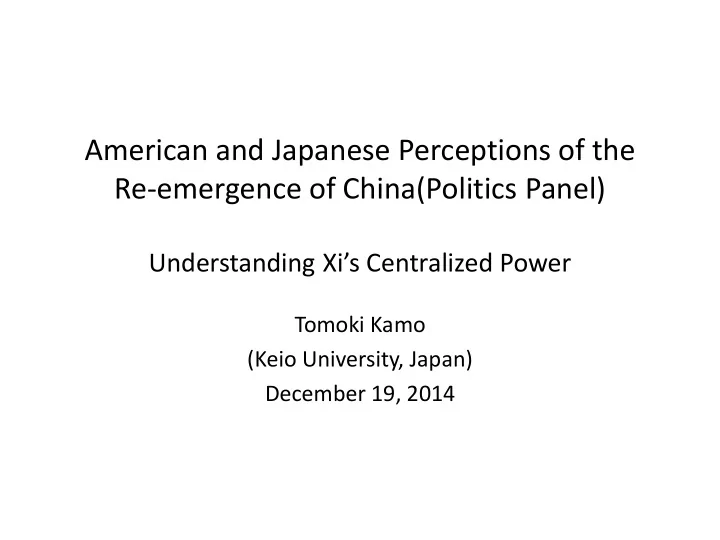

American and Japanese Perceptions of the Re-emergence of China(Politics Panel) Understanding Xi’s Centralized Power Tomoki Kamo (Keio University, Japan) December 19, 2014
• Since the beginning of Xi’s regime, there has been an obvious change in the policy decision-making mechanism. • Decision-making authority is highly centralized. • Monopolize decision-coordination mechanisms. Centralized decision-making mechanisms. • Xi has successfully consolidate his power?
• What has enabled and prompted the concentration of D-M power on Xi? • Sharing sense of insecurity among the party leadership. Public discontent: degradation of the environment; political and bureaucratic corruption; ethnic conflict in Xinjiang and Tibet, economic slowdown in growth. • Sharing desire for a strong and decisive leader.
• Institutionalization – Restrict to the exercise of power; • Term limit and Age limit – Promote intra-party democracy; • Internal poll to select favored top leaders for the future-> “vote” – Activate democratic institutions: • PC, CPPCC • Building several mechanisms of dialogue with non- Party elites
• Decision making mechanism • Collect Information mechanism • CCP try to activate democratic institutions. • CCP has made use of democratic institutions as a means to collect the information for D-M. – PC, CPPCC – Building several mechanisms of dialogue with non- Party elites
• The members of the Democratic Institutions come from a variety of different backgrounds. • Democratic Institutions perform a wide variety political functions. – Serve as a Agents of Gov., Transmit the policy to. – Serve as a Remonstrators, Convey the Information to Gov. – Serve as a Representative, Represent to interest of Constituency.
• Xi has successfully reinforced his power foundation by centralizing decision-making mechanisms. • Promoting institutionalization of power, restrict Xi’s power. • Gathering information for decision-making, Xi’ regime needs more allies, but Anti-corruption campaign has caused changes the behavior of bureaucracy and interest groups.
Recommend
More recommend